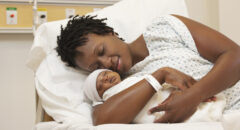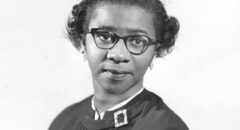
Many aspects of our health are genetically linked. For example, according to researchers from the Institute of Cancer Research at the University of London, there’s a 57 percent chance that a girl will start menstruating within three months of the date that her mother began.
Read: Mom’s Head-To-Toe Guide To Staying Healthy
Here are eight health conditions that experts say we may have inherited from our mothers:
1. Migraines
There’s a 70-80 percent chance that you’ll suffer from migraines if your mother did. Researchers believe that a flawed gene may cause severe headaches and can be passed on.
Celebrate great health! LIKE us on Facebook!
If this gene is defective, outside factors, like light, are more liable to trigger pain centers in the brain that cause headaches.
Other triggers include sensitive foods like chocolate, coffee, cheese, citrus fruit and red wine and should be avoided. Also, be aware that hormones during your menstrual cycle can set them off.
2. Breast Cancer
Read: The Top 3 Disease Killing Black Women
Women who carry the mutated gene BRCA1 or BRCA2 are more at risk to develop breast cancer. Most women who have the defective gene will develop cancer at a very young age, says cancer geneticist, Dr. Elizabeth Rapley.
As a preventative measure, it’s extremely important for women to get mammograms after age 40. If you have a blood relative who has had breast cancer, you can also get genetically screened and be more closely monitored. Some women, who have the mutated gene and a family history of cancer get prophylactic mastectomies to reduce their chances of developing the disease.
3. Fitness Levels
We can inherit up to 50 percent of our fitness levels genetically. Even though we all need to exercise to build muscle, it is true that people require far less physical activity to achieve the same amount of tone and fitness level. Unfair, we know.
Louise Sutton, the head of Carnegie Centre for Sports Performance at Leeds Metropolitan University, says, “You need to do 30-45 minutes of moderate to high-intensity aerobic activity, such as running, swimming or cycling, preferably with bursts of speed, on at least three days a week.” Adding resistance and stretching will also help.
4. Depression
Mental illness, including depression, is known to run in families, and studies say there is a 10 percent chance you inherit it if you have a family history.
According to the chief executive of Depression Alliance, Emer O’Neill, make sure you get enough sleep and watch your alcohol intake—fatigue, stress and drinking can all increase your risk of suffering from depression.
5. Obesity
People who carry two copies of the fat FTO gene have a 70 percent higher chance of being obese than those with none. Another study found that 4 percent of girls with normal-weight mothers were obese, while 41 percent with overweight mothers became obese. According to Sutton, apple-shaped bodies are more genetically linked than pear-shapes and thin figures.
Interestingly enough, a 2009 study discovered strong ties between mother-daughter obesity and father-son obesity, but no links between genders.
Of course, there may be a nurture as well as a nature connection to obesity. Did your overweight mom encourage you to eat more as you were growing up? She may have established a pattern you find hard to break. While you can’t control genetics, watching your calorie and fat intake will help you maintain a healthy weight, as will exercising and living an active lifestyle.
6. Rheumatoid Arthritis
You’re up to 50 percent more likely to develop rheumatoid arthritis if your mother had it. This condition occurs when the immune system attacks the body, which leads to inflammation that affects joint lining and cartilage. Still, a family history does not necessarily mean you will get the disease.
Arthritis researcher Alan Silman points out that rheumatoid arthritis is more often seen in people who smoke and consume large quantities of red meat and caffeine.
7. Alzheimer’s
The Alzheimer’s Society has identified genes that can be passed on, making some people predisposed to certain types of dementia. If your mother suffered from early-onset Alzheimer’s, your risk of developing the disease is increased about 30-50 percent. There’s also a 3-5 percent increased chance you will get dementia.
Chief executive of the Alzheimer’s Society, Ruth Sutherland, says that keeping a healthy weight, and keeping your blood pressure and cholesterol at a healthy level after age 35 can help reduce your risk of developing dementia by 20 percent.
8. Heart Disease
If your mother had a heart attack or suffered chest pain due to blocked arteries, several studies revealed that your chance of developing heart disease is upped 20 percent.
In addition, a study done at Oxford University showed that your chance of having a stroke also increases if your mother suffered from one. This is because the inherited vascular disease affects the coronary artery in the heart as well as the cerebral artery in the brain.
However, the exact reason why a mother’s history with stroke affects her daughter’s heart is still unknown. Researchers are still not sure whether genes or lifestyle factors play a bigger role.
Maintaining a healthy lifestyle is imperative to having a healthy heart. That means, maintain a healthy weight, eat food low in saturated fat and salt, don’t smoke and keep your alcohol consumption to a minimum.








